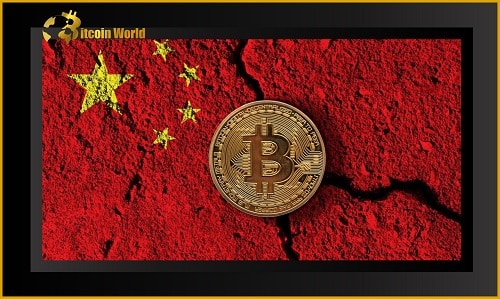Buckle up, crypto enthusiasts! The rollercoaster ride of the crypto market just got a whole lot bumpier. As if the Russia-Ukraine conflict wasn’t enough to send Bitcoin and altcoins into a tailspin, a new geopolitical hotspot is emerging: Taiwan. Are we looking at a double whammy of global uncertainty impacting your digital assets?
Why is Taiwan Suddenly in the Crypto Spotlight?
Let’s rewind a bit. The Russia-Ukraine crisis has already demonstrated how deeply intertwined crypto markets are with global events. Remember the market dip when the conflict intensified? Well, now traders are eyeing Taiwan with increasing concern. Reports of Chinese aircraft entering Taiwan’s airspace have ignited fears that Taiwan could become “the next Ukraine.” This speculation adds another layer of complexity to an already volatile crypto landscape.
Taiwan’s President Tsai Ing-wen has responded to these rising tensions by calling for heightened security measures on the island. This move further underscores the seriousness of the situation and its potential ramifications.
Geopolitics and Crypto: A Volatile Mix
The Ukraine crisis has served as a stark reminder that crypto, like traditional financial markets, is not immune to geopolitical shockwaves. This month alone, conflict-induced volatility erased a staggering $400 billion from the crypto market. When global tensions rise, investors often flock to safer havens, leading to sell-offs in riskier assets like cryptocurrencies.
But the Taiwan situation brings another critical element into play for the crypto world: semiconductors.
Taiwan: The Unsung Hero of Crypto Mining?
Did you know Taiwan is the world’s leading supplier of semiconductors? These tiny chips are the backbone of countless industries, and crucially, they are essential for crypto mining. Any disruption to Taiwan’s semiconductor supply chain could have significant and far-reaching consequences for the crypto mining industry globally.
Think about it: the ongoing chip shortage since 2020 has already driven up the prices of graphics cards (GPUs). GPUs are a vital component for mining many cryptocurrencies. Imagine what would happen if the supply chain from Taiwan, a major semiconductor producer, faced disruptions due to geopolitical instability!
Could China Make a Move on Taiwan? Lessons from Ukraine
The global response to Russia’s actions in Ukraine is being closely watched worldwide. Some observers on platforms like Twitter have voiced concerns that a perceivedly lukewarm response from the West to Russia’s invasion might embolden China to consider similar actions against Taiwan.
While Western nations have imposed sanctions on Russia, critically, they have stopped short of completely isolating Russia from the global banking system. Furthermore, a significant portion of Russia’s oil exports to Europe remains unaffected by sanctions. This measured response, while aimed at de-escalation, could be interpreted differently by other global powers.
British Prime Minister Boris Johnson himself warned last week that a weak Western stance on Ukraine could set a dangerous precedent, potentially putting Taiwan at increased risk. This highlights the interconnectedness of global security and the potential domino effect of geopolitical events.
China’s Stance: “Taiwan is Not Ukraine”
China maintains that Taiwan is an integral part of its territory, a stance they’ve reiterated by stating that Taiwan is fundamentally different from Ukraine. This assertion is crucial to understanding China’s perspective on the matter.
However, Taiwan vehemently rejects this claim, asserting its sovereignty and independence. This fundamental disagreement is at the heart of the ongoing tensions and the uncertainty surrounding the region’s future.
What Does This Mean for Crypto Traders? Actionable Insights
So, what should crypto traders and investors make of all this geopolitical turmoil? Here are a few key takeaways and actionable insights:
- Increased Volatility is Here to Stay: Geopolitical uncertainty translates directly into market volatility. Expect continued price swings in the crypto market as long as these tensions persist.
- Diversification is Key: Don’t put all your eggs in one basket. Diversify your crypto portfolio and consider holding some assets outside of crypto, especially during times of heightened risk.
- Stay Informed: Keep a close eye on geopolitical developments, particularly news related to Russia-Ukraine and China-Taiwan. Real-time information can help you make more informed trading decisions.
- Risk Management is Crucial: Implement robust risk management strategies. Use stop-loss orders and manage your position sizes carefully to protect your capital during volatile periods.
- Long-Term Perspective: While short-term volatility is concerning, remember the long-term potential of cryptocurrencies. Geopolitical events often create temporary dips, which can present buying opportunities for long-term investors with a strong conviction in the crypto space.
The Road Ahead: Navigating Crypto in a Geopolitically Charged World
The confluence of the Russia-Ukraine conflict and rising China-Taiwan tensions has injected a significant dose of uncertainty into the crypto market. While the long-term trajectory of cryptocurrencies remains promising, the near future is likely to be characterized by continued volatility and sensitivity to geopolitical events. For crypto traders and investors, staying informed, managing risk effectively, and maintaining a balanced perspective are paramount to navigating these turbulent times. The world is watching closely – and so should your crypto portfolio.
Related Posts – Ferrari joins the NFT universe through a collaboration with a Swiss…
Disclaimer: The information provided is not trading advice, Bitcoinworld.co.in holds no liability for any investments made based on the information provided on this page. We strongly recommend independent research and/or consultation with a qualified professional before making any investment decisions.




